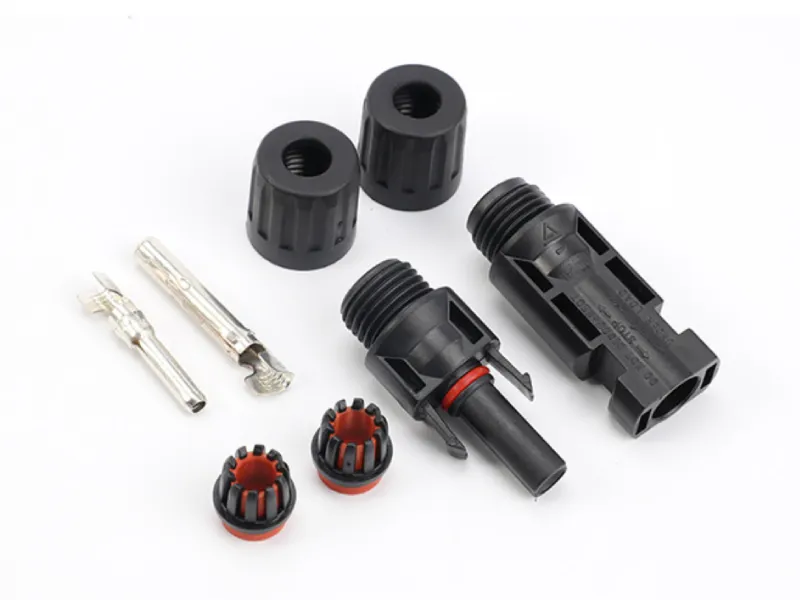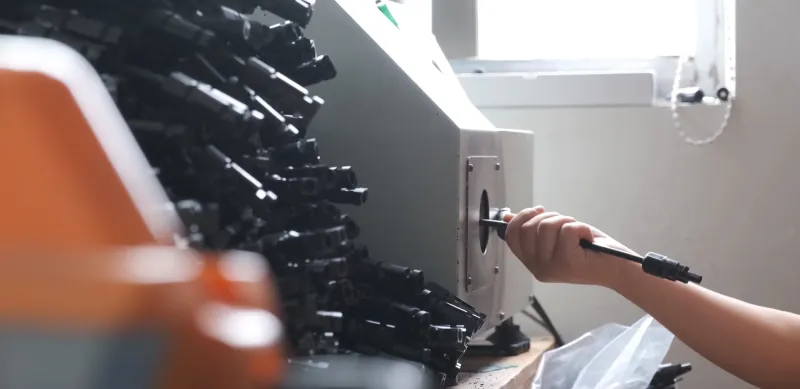In the competitive solar energy market, selecting the right procurement channel for critical components like MC4 solar connectors can significantly impact your business’s bottom line and project quality. As China dominates the global production of these essential connectors, businesses face a crucial decision: should you purchase directly from MC4 solar connector factories in China, or work through established trading companies? This comprehensive guide examines both options to help you determine the most efficient, cost-effective procurement strategy for your specific needs.
Understanding MC4 Solar Connectors and Their Importance
What Are MC4 Solar Connectors?
MC4 connectors are standardized interconnection devices specifically designed for photovoltaic systems. These waterproof electrical connectors ensure reliable, safe connections between solar panels and inverters, playing a critical role in system performance and longevity. Their name derives from the original manufacturer (Multi-Contact, now Stäubli) and the 4mm diameter contact pin they utilize.

Critical Quality Factors in MC4 Connector Selection
When sourcing MC4 connectors, several quality factors demand attention: material composition (typically high-grade copper conductors with UV-resistant polymer housing), precision manufacturing, proper certification (TÜV, UL), and consistent performance specifications. Substandard connectors can compromise an entire solar installation, making procurement decisions particularly consequential.
Impact of Connector Quality on Solar System Performance
High-quality MC4 connectors minimize power losses, reduce fire risks, and extend system lifespan. Poor-quality connectors can lead to increased resistance, connection failures, and potential safety hazards. For installers and distributors, connector reliability directly affects warranty claims, maintenance costs, and ultimately, reputation in the market.
Direct Factory Procurement of MC4 Solar Connectors
Advantages of Factory Direct MC4 Solar Connector Purchases
Purchasing directly from Chinese MC4 solar connector manufacturers offers several distinct advantages. First, eliminating intermediaries typically results in lower per-unit costs – often 15-30% less than through trading companies. Direct factory relationships also enable customization options for specifications, packaging, and branding. Additionally, factory-direct buyers gain direct access to production engineers for technical support and quality control personnel for addressing specification concerns.
Potential Challenges When Buying Direct from Chinese Manufacturers
Despite the benefits, direct procurement presents significant challenges. Language barriers can complicate negotiations and technical discussions, while cultural differences may affect business expectations. Minimum order quantities (MOQs) are typically higher with factories, often requiring bulk purchases that may strain inventory management. Additionally, factories often prioritize larger customers, potentially affecting production schedules for smaller buyers.
Ideal Scenarios for Factory Direct Procurement
Factory direct procurement works best for businesses with consistent, high-volume needs. Solar distributors, large-scale project developers, and equipment manufacturers who require thousands of connectors monthly will benefit most from direct relationships. Companies with procurement staff experienced in international sourcing and the capability to handle larger inventory levels should also consider the direct approach.
Working with Trading Companies for MC4 Solar Connectors
Benefits of Sourcing Through Trading Companies
Trading companies offer valuable services that simplify procurement. They typically provide English-speaking representatives who understand both Western business expectations and Chinese manufacturing practices. Lower minimum order quantities accommodate smaller businesses or those with fluctuating demands. Many trading companies offer consolidated shipping with other solar components, simplifying logistics. Additionally, established traders often pre-screen factories for quality and reliability.
Common Drawbacks of the Trading Company Approach
The most obvious disadvantage is increased cost – trading companies typically add 10-40% to factory prices. Communication may also pass through multiple layers, potentially diluting technical requirements or specifications. Some trading companies represent multiple factories of varying quality levels, potentially resulting in inconsistent products if not carefully managed.
When Trading Companies Make the Most Sense
Small to medium businesses, new market entrants, and companies without dedicated international procurement teams benefit most from trading companies. Organizations with diverse product needs (beyond just MC4 connectors) can leverage trading companies’ broader supplier networks. Projects with tight timelines may also benefit from traders’ ability to source from multiple factories to meet deadlines.
Cost Comparison: Factory Direct vs. Trading Company
Pricing Structures and Minimum Order Quantities
Factory direct pricing typically ranges from $0.20-0.60 per connector pair (depending on specifications and volume), with MOQs often starting at 5,000-10,000 pairs. Trading companies might charge $0.30-0.85 per pair but accept orders as small as 500-1,000 pairs. Volume discounting structures also differ significantly, with factories offering steeper discounts at higher quantities.
Hidden Costs in Both Procurement Methods
Beyond the unit price, consider additional expenses. Factory direct procurement may require investment in quality inspection visits, international wire transfer fees, and potentially higher shipping costs for single-product shipments. Trading companies may charge hidden fees for services like expedited orders or special packaging requirements, though they often absorb some logistics complexities.
Long-term Cost-Benefit Analysis
A comprehensive analysis must consider total landed cost per unit over time. While factory direct purchases offer lower unit costs, the additional overhead of managing international relationships, quality control, and logistics may offset some savings. Conversely, trading company premiums include valuable services that eliminate internal costs. Your business volume, internal capabilities, and cash flow requirements will determine which approach yields better long-term value.
Quality Assurance Considerations
Factory Certification and Quality Control Processes
Reputable MC4 connector factories maintain internationally recognized certifications including ISO 9001, TÜV, UL, and IEC standards. Direct procurement allows firsthand verification of manufacturing processes, material selection, and testing protocols. Leading factories implement statistical process control, automated testing, and rigorous quality management systems that can be directly assessed.
How Trading Companies Verify Product Quality
Established trading companies implement their own quality verification processes, including factory audits, sample testing, and pre-shipment inspections. The best trading partners maintain quality control staff who understand connector specifications and testing requirements. However, their processes add another layer between you and the actual production.
Implementing Your Own Quality Verification Steps
Regardless of procurement path, implement independent quality verification. Develop detailed specification requirements including material composition, dimensional tolerances, and performance parameters. Consider third-party inspection services (like SGS or Bureau Veritas) for pre-shipment verification. Establish incoming quality control procedures to test random samples from each shipment against specifications.
Building Successful Business Relationships in the Chinese Solar Market
Communication Strategies with Chinese Manufacturers
Effective communication requires understanding cultural contexts. Chinese business relationships value long-term commitment and face-to-face interactions. Utilize clear, written specifications with diagrams rather than relying solely on verbal agreements. Consider hiring translators for technical discussions to ensure precise understanding. Video conferencing helps bridge physical distance when in-person visits aren’t possible.
Understanding Cultural Business Differences
Chinese business culture emphasizes relationship building (guanxi) before transaction details. Initial meetings may focus more on company history and vision than immediate business terms. Decision-making often involves multiple stakeholders and may require patience. Understanding these differences prevents frustration and builds stronger partnerships regardless of whether you work directly with factories or through trading companies.
Establishing Long-term Supply Partnerships
Sustainable procurement strategies look beyond single transactions. With factories, gradually increase order volumes to gain priority status. Consider development partnerships for new product specifications. With trading companies, communicate growth plans to negotiate improving terms over time. Either way, consistent ordering patterns and prompt payment build trust and potentially unlock preferential treatment.
Practical Decision Framework for Your MC4 Connector Procurement
Assessment Questions to Determine Your Optimal Sourcing Strategy
Consider these key questions when making your decision:
- What annual volume of MC4 connectors does your business require?
- Do you have staff with international procurement experience and language capabilities?
- How critical are customization options for your business model?
- What inventory carrying capacity does your operation maintain?
- How important is technical support from the manufacturer?
- Do you need to consolidate shipping with other components?
Hybrid Approaches That Combine Both Methods
Many successful businesses implement hybrid strategies. Some use trading companies for initial market entry, then transition to direct factory relationships as volumes increase. Others maintain relationships with both channels—using direct factory procurement for standard, high-volume needs while leveraging trading companies for specialty requirements or emergency orders when factories can’t meet tight deadlines.
Real-World Procurement Success Stories
Leading solar distributors have improved margins by transitioning to factory-direct purchasing after establishing quality benchmarks through trading companies. Conversely, rapidly growing installers often benefit from trading companies’ flexibility during expansion phases. The most successful procurement strategies adapt over time as business requirements evolve.
Conclusion: Making the Right Choice for Your Business
The optimal procurement strategy for MC4 solar connectors depends on your specific business context. Factory direct sourcing offers cost advantages and technical control ideal for high-volume operations with international procurement experience. Trading companies provide valuable services, lower entry barriers, and simplified logistics that benefit smaller operations or those new to international sourcing.
Consider starting with a trading company if you’re new to Chinese procurement, then gradually exploring direct relationships as your volume and experience grow. Alternatively, larger operations might immediately pursue factory partnerships while maintaining trading company relationships as backup channels.
Ultimately, successful procurement isn’t just about finding the lowest unit price—it’s about developing reliable supply chains that consistently deliver quality products that meet your specifications and timeframes. By understanding the strengths and limitations of both approaches, you can implement a strategic sourcing plan that supports your business objectives while maintaining the quality standards your customers expect.
When considering factory options for MC4 solar connectors, VIOXElectric stands out as a manufacturer that offers the best of both worlds. As a factory, VIOX Electric provides the cost advantages of direct purchasing while offering lower minimum order quantities typically associated with trading companies. They combine high-quality manufacturing with responsive customer service, technical support, and flexible shipping options usually found only through intermediaries. For businesses looking to balance quality, cost, and service in their solar connector procurement, Viox Electric represents an option worth exploring in your supplier evaluation process.
Related Source
MC4 Solar Connector Manufacturer
MC4 Solar Connector Manufacturing Process: A Comprehensive Explanation



